HIV is not a death sentence - Elvis Basudde
After a near-death experience, Elvis Basudde vowed to fight the scourge using his pen.
A LOOK AT HIV
As a journalist profiling people living with HIV and describing its effects on them, Elvis Basudde had no idea that one day he would be describing the impact of the scourge on himself.
It was Basudde, together with Antony Mugere (currently a lecturer at Makerere University), who first profiled Canon Gideon Byamugisha, an Anglican priest in Uganda, who was the first African religious leader to publically declare his HIV status. That was 1997.
Basudde's articles on pop vocalists Prince Jjuuko, Livingstone Kasozi and Herbert Sekabembe, who succumbed to HIV/AIDS, ran in 1995 and 1997. Five years later, in 2002, Basudde fell ill.
Towards August 2002, Basudde suspected that he could be having HIV and he was terrified. This was because he had started losing weight abnormally. He increasingly became weak. He quietly disappeared from his workplace — New Vision — without telling anyone, not even his editor, Barbara Kaija.
He became critically sick, but kept aloof and hid himself in his house in Namasuba on Entebbe Road. He absconded from duty for over a month because he did not want to become a laughing stock. While still in hiding, Kaija surprised him when she arranged for the company driver to take him to hospital. Basudde was surprised because it had never occurred to him that anybody at the workplace knew what he was suffering from.
"I am sick, I am not coming to work," Basudde answered the caller.
"We know you are sick.
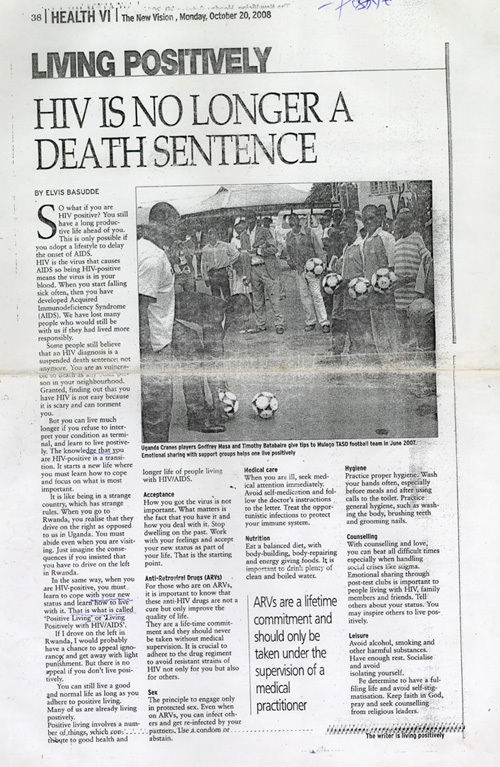
Barbara (Kaija) asked me to call you so that you can direct us to your home and we take you to the hospital," replied the caller. Basudde was surprised beyond description. But he was particularly mesmerised by Kaija's unprecedented altruism.
Instead of reprimanding him for absconding from work, here she was offering him a company vehicle to take him to hospital.
He was picked from his hide-out and taken to the Joint Clinical Research Centre (JCRC), where he was admitted with full-blown AIDS. He stayed there for six months.
"At the time of admission, my CD4 cell count was 12, (normal is 400-1,600), which meant that my immune system was almost non-existent," he says.
He was down to 35kg from 79kg. Whenever he looked at his body, he saw a stranger.
"My face was sunken. I had a brain scan and the doctor said my brain had shrunk. I looked frail, emaciated and pale. I told myself that I was going to die. I was feeding through tubes and the waste was being extracted by catheter. I became unconscious and went into coma for weeks," he recalls.
He was devastated, not because he was infected, but because he feared facing the truth. It took him several months to come to terms with the reality. After being discharged from hospital, for two years, he was home-bound because he had been struck with serious paralysis and was immobile. He had also been confined to a wheelchair.
"At the beginning, I was in shock and then I was angry. Anger mounted to heartbreak, grief, then surrender and acceptance. There was need to fight back, not just wait to die. I decided to take action against HIV. I had a duty to tell Ugandans and the whole world that I did not choose to be infected with this dreaded virus," he says.
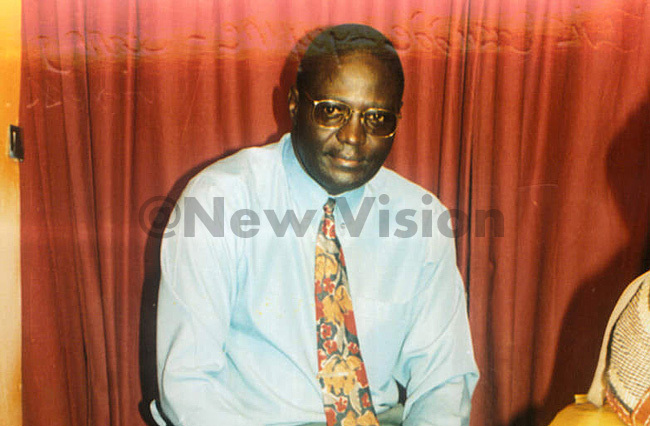 Elvis Basudde back in the day
Elvis Basudde back in the day
Reality knocks
After a near-death experience, he vowed to fight the scourge using his pen.
He launched an anti-AIDS crusade, and the first step was to disclose his serostatus. He started by writing about his experience in the New Vision.
"I came out of my hideout, and found a stage where I could tell the whole world that I was not a victim, but rather a messenger of hope. I wanted people to know that although the virus had robbed me of my health, it did not take away my humanity and dignity," he says.
Basudde says all he required was not pity, not even sympathy, but for people to appreciate him as a normal person worth being alive.
"The virus had only weakened me, but I still mattered and I was not a number, a statistic but an activist."
Basudde eventually declared his status publicly and went down into the archives in East and Central Africa as the fi rst journalist to declare his HIV status.
"I wanted to give a face to HIV, especially among professionals.
To let them know that with good care, love and treatment, one can still enjoy a good degree of health and even continue practising their profession in spite of having HIV," he says.
Today, the story is different. Basudde is free from AIDS. He is an irrefutable example of health and vitality, and demonstrates no trace of his former condition.
He has gone from a frightened victim to flagbearer for new views about HIV. His life has only got better and better.
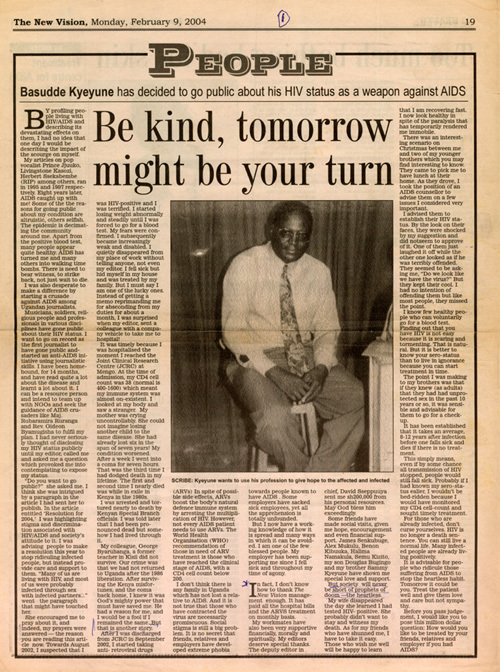
Coping
Basudde says he managed to live because he accepted his status as a part of his life. He refused to interpret his condition as terminal and, more importantly, he leant to live positively.
"I struck a deal with the virus. I told the virus: ‘You kill me, you also die, because you cannot live without me. So, let us agree to live together.' But the virus didn't keep its part of the bargain. It broke the agreement by making me ill," he says. Basudde then hit back with antiretroviral drugs (ARVs).
ARVs have given him another lease of life, and he has committed himself to taking them daily for the rest of his life.
He says he cannot imagine how his life would be without ARVs. Basudde has since remarried (his wife had walked out on him when he was bedridden). The couple has two healthy children.
"My wife and I can still live as long as we could have lived, but through a lifestyle we know as positive living. This is a lifestyle where someone who has HIV aims at delaying the onset of AIDS," Basudde stresses.
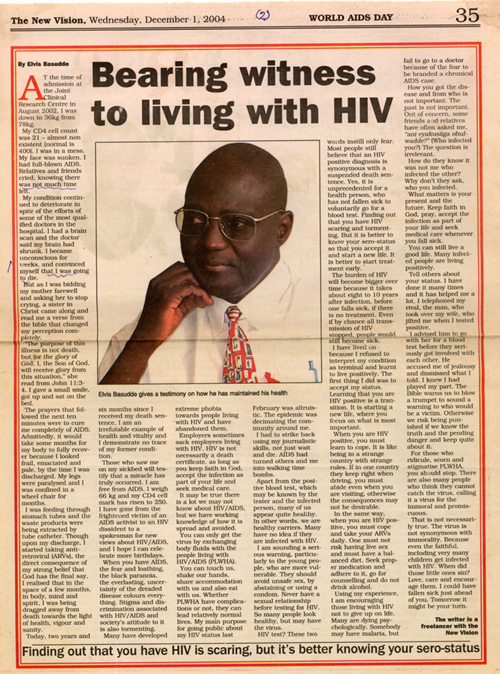
Advice
Basudde says testing for HIV instills fear. Most people still believe that an HIV-positive diagnosis is synonymous with a suspended death sentence. He believes that it is unprecedented for a person who is not sick to voluntarily go for an HIV test.
"Finding out that you have HIV is scaring and tormenting. That is natural. But it is better to know your serostatus than to live in ignorance. If you are diagnosed with HIV, you can start treatment in time," he says. Basudde says if he had known his serostatus earlier, probably he would not have become bedridden because he would have monitored his CD4-cell count and sought early treatment.
"Those who are already infected should know that they can still live a normal life as long as they adhere to their medication," he says.
Basudde advises youth to put abstinence first or use a condom and never to a sexual relationship with anyone before testing for HIV.
"For those already infected with the virus, do not lose hope because HIV is not a death sentence. What matters is your present and tomorrow.
Tell others about your status and join networks of people living with HIV. Adhere to your medication. Avoid re-infection, have a balanced diet, don't drink alcohol, go for counselling and keep faith in God," he says. For those who ridicule and stigmatise people living with HIV, Basudde urges them to stop. "Those who call HIV a virus for the immoral and promiscuous, should stop.
There are children born with the virus, when did they become immoral?" he says.
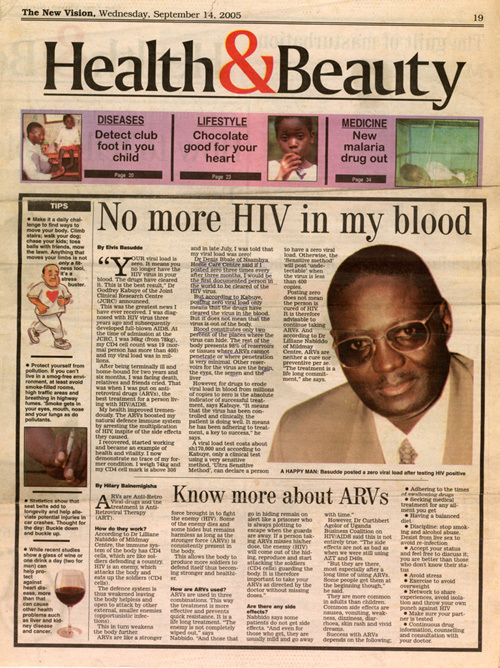
Appreciation
Basudde is thankful to the management of New Vision (his employer) that paid all the hospital bills when he was admitted at the JCRC, and also paid for his initial ARVs treatment for two years.
He says his workmates were also supportive financially, morally and spiritually. "They made social visits when I was on my sick bed, gave me hope, encouragement and even financial support."